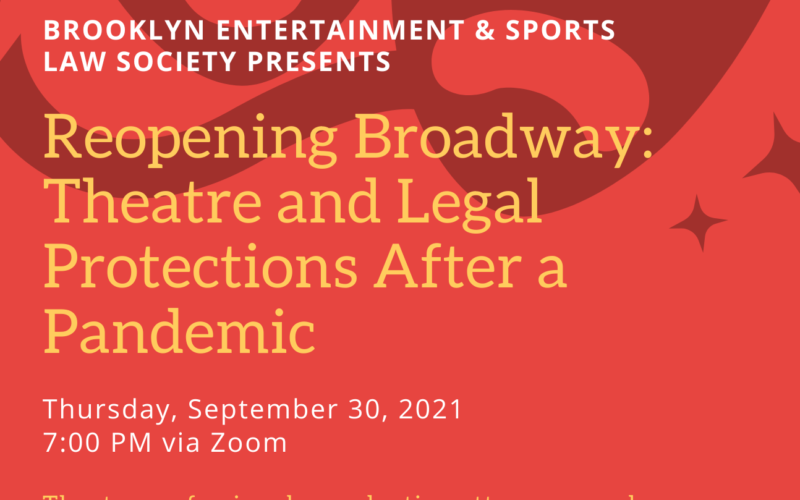On Thursday, September 30th, BESLS hosted a Theater Panel with panelists Lauryn Ciardullo, Charles Messina, Jean Ward, Mark Merriman, and Wendy LaManque on Zoom to discuss reopening Broadway during the pandemic. Theater Chairs Kacy Vance and Alejandra Pereira led the discussion about challenges the panelists faced as the theater industry struggles to find a new norm. Lauryn Ciardullo performed in the original Broadway cast of Aladdin as an understudy for Princess Jasmine and a swing for several ensemble tracks. She did not return to the show upon reopening due to long-term COVID effects. Charles Messina is part of the producing team and writer of the new Broadway-bound Dion DiMucci musical The Wanderer, set to open out of town at the Papermill Playhouse in January 2022. Jean Ward has 30 years of experience providing counsel to artists and productions on and off-Broadway. Mark Merriman, a Brooklyn Law School professor and alum, as well as former assistant to Jean Ward, is a partner in The Entertainment Group at Frankfurt Kurnit Klein & Selz. Wendy LaManque, also a Brooklyn Law School alum, develops over a dozen collective bargaining agreements as the Eastern Counsel for the American Guild of Musical Artists.
The conversation began with the phrase that summed up the last year and a half, “risk mitigation.” Lauryn Ciardullo spoke on an impactful note of humanity, addressing her experience with long-term COVID effects. The exhausting impact of lingering symptoms required that she step back from her tenure of more than five years in the Aladdin cast. On a related note, Aladdin just announced that they will close their doors until October 12, despite reopening just days prior, due to positive covid tests. Charles Messina represented the interest of some of Broadway’s producers, looking at the enormous financial risk posed for large-scale musicals opening on Broadway as the pandemic continues to pose significant threats to their viability. In the modern world of Broadway musicals, where 60% of the weekly gross potential often represents the weekly income necessary to break even, the odds of recouping the $10-20 million capitalization presented grim odds before the pandemic (about 20%). When shutdowns and lacking tourism deplete weekly box offices, big musicals can be tough to sell to audiences and investors. Messina appealed to the lawyers on the call, asking, what can we do to make the model of commercial theater manageable? Everyone on the panel took a deep breath as the elephant in the room announced itself. After a few moments of exasperated silence, Mark Merriman stepped forward to address the question.
Broadway’s response to the pandemic has been historically singular and emblematic of the industry’s culture. Merriman traced the history of Broadway shutdowns, citing well over 100 years of tragedies, pandemics, and union disagreements that never led to more than a week of canceled performances. In response to Messina, Merriman redirected him from a legal question to a social question that we all need to answer for ourselves. Why do we create theater? What function does this institution serve, and why do we conflate the institution with the industry? No matter how creative lawyers get, “we have some growing to do as a country, and no contract is going to solve it.” Jean Ward echoed Merriman’s statement, pointing to her work with productions on tour, currently hobbling along. No clause in a contract can make the return to theaters easier. The consensus opinion in the Zoom pointed to West End theaters, already four months into performances, and concluded that Broadway could have come back any time. It did not because decision-makers looked at the cost before they looked at the people.
With Broadway’s lights growing dim, what could the future look like? Wendy LaManque took to the stage to address this question, expounding on her expertise in labor law. Where some see the devastating decline of the behemoth Broadway industry, LaManque sees opportunity. She noted that, for the first time, Broadway shows came into the home of their viewers. Broadway became accessible to audiences all over the world who could not previously attend shows. The price for a fantastic, accessible orchestra seat to Hamilton tumbled from $300 to the price of a Disney+ subscription. The work successfully playing out live in New York looks completely different, too. Plays flood the theaters! Pieces like Pass Over and Chicken and Biscuits lead a new Broadway that does not exist to rake in cash but to tell stories that simply have to be told by artists and seen by audiences. One could argue that COVID devastated the model of Broadway production, but it is more likely that it only magnified the cracks that already existed. Perhaps the challenges occurring in returning to Broadway do not signal the end of an institution, but the end of an industry. The institution has always been and will always be more than the industry. As Broadway’s path forward slowly turns in a new direction, the future looks bright for enterprising law students eager to shape and build what comes next.
We wish to thank each panelist whose utter sincerity, humility, and passion for their work allowed us to have a discussion so engrossing we could have talked all night.
Written by: Aidan Cleary
Aidan is a 2024 J.D. Candidate at Brooklyn Law School




